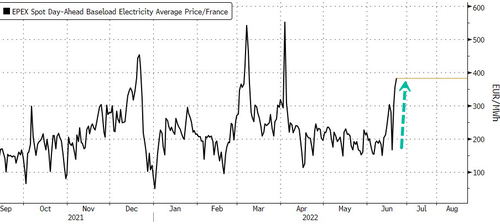
European day-ahead power prices continue to soar for the third day due to an early-season heat wave driving up cooling demand, lack of renewable energy generation, declining nuclear power, and soaring natural gas costs.
Large swaths of Europe over the weekend experienced temperatures above 100 degrees Fahrenheit (38 Celsius). The hottest temperatures were from Spain to Germany to France.
(7) European Heat Wave:Yesterday 19 June 3 more monthly records were beaten in France, while the real exceptional event had moved west to central Europe. They are:
— Extreme Temperatures Around The World (@extremetemps) June 20, 2022
Langres 35.3C
Challes-les-Eaux 37.5C
Chambery 36.7C pic.twitter.com/chrDNh9Owk
Bloomberg notes power grids were under stress as wind generation in Germany and Italy plunged, forcing the need to increase the capacity of fossil fuel power generators to make up for the lost power. This placed a bid under electricity prices as the cost to generate power soars because of tightening supplies due to declining Russian flows.
"Already high gas prices, combined with low wind output will require less efficient, higher cost gas plants to fire up, pushing up prices," BloombergNEF's Andreas Gandolfo said.
Day-ahead power prices in France traded at 383.14 euros ($404.08) a megawatt-hour, up more than 64% from last week.
Besides tight fossil fuel supplies and a lack of renewable power from Germany and Italy, half of France's 56 nuclear reactors are offline. France was the biggest net exporter of power last year, supplying many European countries.
French nuclear power is needed when renewable energy is lacking. Also, Brussels' drive for net-zero carbon emissions and weening off Russian fossil fuels has made the energy crisis on the continent worse.
To avert a more profound crisis, German Vice-Chancellor and Economy Minister Robert Habeck said Sunday that the country is increasing coal generation to increase power output.
The decision comes just days after Russian gas company Gazprom announced that it was reducing supplies through the Nord Stream 1 pipeline for "technical reasons."
Meanwhile, the Netherlands is following Germany to increase coal-fired power station output to prevent an energy crisis (Greta Thunberg isn't going to be happy about this).
A perfect storm of factors shows Europe's power grid is vulnerable to blackouts this summer unless more energy generating capacity can be restored. So far, the continent is desperately trying to restart fossil fuel power units after retiring them for the failed green transition.
European day-ahead power prices continue to soar for the third day due to an early-season heat wave driving up cooling demand, lack of renewable energy generation, declining nuclear power, and soaring natural gas costs.
Large swaths of Europe over the weekend experienced temperatures above 100 degrees Fahrenheit (38 Celsius). The hottest temperatures were from Spain to Germany to France.
(7) European Heat Wave:Yesterday 19 June 3 more monthly records were beaten in France, while the real exceptional event had moved west to central Europe. They are:
Langres 35.3C
Challes-les-Eaux 37.5C
Chambery 36.7C pic.twitter.com/chrDNh9Owk— Extreme Temperatures Around The World (@extremetemps) June 20, 2022
Bloomberg notes power grids were under stress as wind generation in Germany and Italy plunged, forcing the need to increase the capacity of fossil fuel power generators to make up for the lost power. This placed a bid under electricity prices as the cost to generate power soars because of tightening supplies due to declining Russian flows.
“Already high gas prices, combined with low wind output will require less efficient, higher cost gas plants to fire up, pushing up prices,” BloombergNEF’s Andreas Gandolfo said.
Day-ahead power prices in France traded at 383.14 euros ($404.08) a megawatt-hour, up more than 64% from last week.
Besides tight fossil fuel supplies and a lack of renewable power from Germany and Italy, half of France’s 56 nuclear reactors are offline. France was the biggest net exporter of power last year, supplying many European countries.
French nuclear power is needed when renewable energy is lacking. Also, Brussels’ drive for net-zero carbon emissions and weening off Russian fossil fuels has made the energy crisis on the continent worse.
To avert a more profound crisis, German Vice-Chancellor and Economy Minister Robert Habeck said Sunday that the country is increasing coal generation to increase power output.
The decision comes just days after Russian gas company Gazprom announced that it was reducing supplies through the Nord Stream 1 pipeline for “technical reasons.”
Meanwhile, the Netherlands is following Germany to increase coal-fired power station output to prevent an energy crisis (Greta Thunberg isn’t going to be happy about this).
A perfect storm of factors shows Europe’s power grid is vulnerable to blackouts this summer unless more energy generating capacity can be restored. So far, the continent is desperately trying to restart fossil fuel power units after retiring them for the failed green transition.







